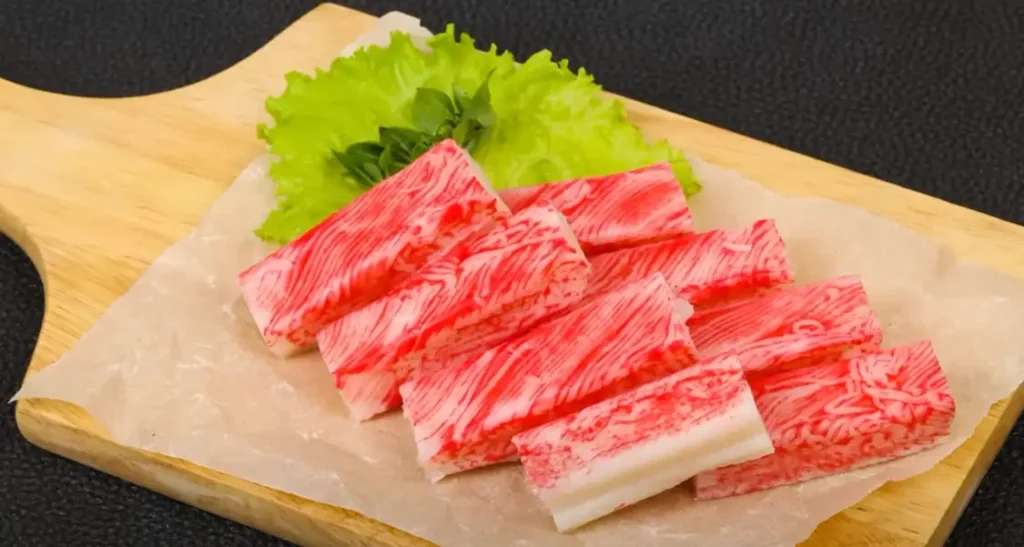√√ REVIEWED & FACT-CHECKED BY
Curious about whether your feline friend can enjoy imitation crab meat? If you’ve ever wondered, ‘Can cats eat imitation crab meat?’ you’re not alone. As pet owners, we want to ensure our cats’ diet supports their overall health and well-being. Imitation crab meat, or surimi, is a popular seafood substitute in human cuisine, but does it meet the nutritional needs of our cats?
Let’s learn more about imitation crab meat, examining its ingredients, nutritional value, and potential risks for cats. We’ll explore how it differs from real crab meat and why it may not be the best choice for your pet.
By understanding these factors, you can make informed decisions about your cat’s diet and ensure their meals contribute to a long, healthy, and happy life. Let’s uncover the facts and see if imitation crab meat is safe for your feline friend.
What is Imitation Crab Meat?
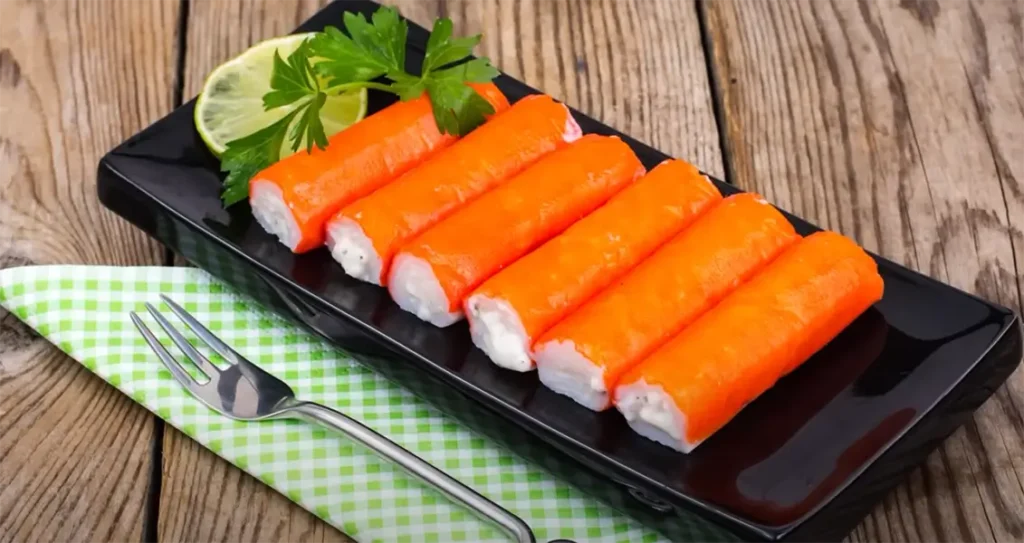
Imitation crab meat, or surimi, is a processed seafood substitute made from blended fish, typically pollock, starches, egg whites, sugars, salts, flavourings, and additives. While it mimics the taste, texture, and appearance of real crab meat, it lacks the natural richness and nutritional complexity.
Understanding its composition is crucial for evaluating its suitability for cats’ diets and discerning potential risks and benefits.
What imitation crab meat is made of?
Imitation crab meat is crafted by transforming processed fish, primarily pollock, into a seafood substitute closely resembling real crab meat. Pollock, known for its mild flavour and flaky texture, is minced and combined with starches like wheat or tapioca to bind the mixture.
Egg whites are added for texture improvement, while sugars and salts enhance flavour. Various flavourings and additives, including crab extract, artificial crab flavour, and colourants, are incorporated to mimic the taste and appearance of real crab meat. The mixture is shaped, cooked, and coloured to resemble the familiar strands of crab meat.
Can Cats Eat Imitation Crab Meat?
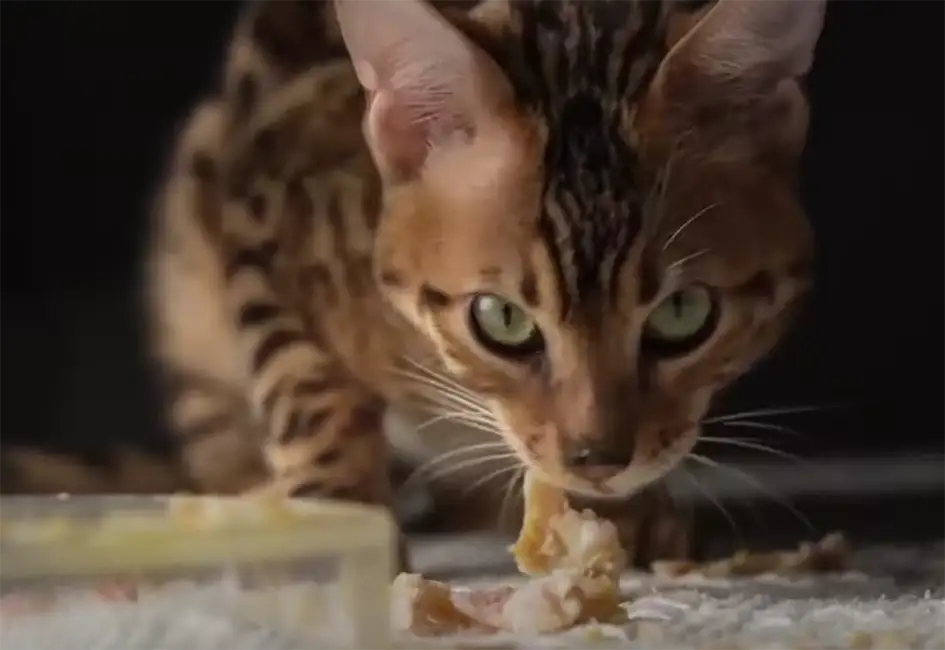
The safety of feeding imitation crab meat to cats is a debate among cat owners and veterinarians. While small amounts may not pose an immediate threat, it’s not recommended as a regular part of their diet. Cats require animal-derived protein to meet their nutritional needs fully.
Imitation crab meat lacks the essential nutrients needed in real crab meat and may contain added ingredients like starches, sugars, and preservatives that aren’t beneficial for cats.
Frequent consumption can result in nutritional imbalances and health problems. It’s best to avoid feeding imitation crab meat to cats and opt for species-appropriate foods and treats instead.
How does it differ from real crab meat?
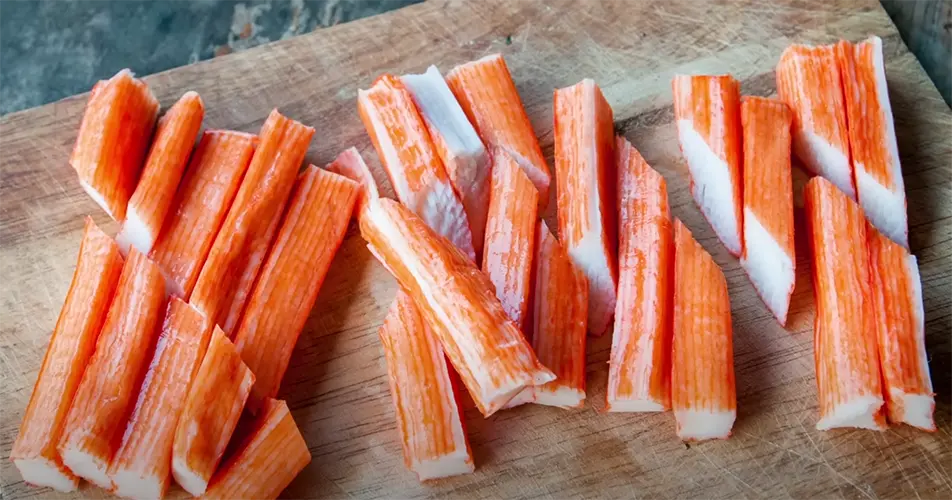
While imitation crab meat may resemble real crab meat in appearance, texture, and taste, the two have significant differences. Real crab meat, harvested from crustaceans like crabs, offers a natural richness and complexity along with essential nutrients such as high-quality protein, omega-3 fatty acids, vitamins, and minerals.
Imitation crab meat lacks the same nutritional profile and may contain added ingredients like starches, sugars, and preservatives. Additionally, processing and additives can impact its taste, texture, and quality, making it less desirable for cats’ diets.
Nutritional Value of Imitation Crab Meat
As cat owners, we must consider the nutritional value of the foods we feed our feline companions. While imitation crab meat provides some protein, it lacks the nutrients cats need for optimal health. Cats are obligate carnivores and require animal-derived protein to meet their unique nutritional needs. Imitation crab meat falls short in amino acid profile and bioavailability compared to real crab meat, making it inadequate for cats. Additionally, it often contains added starches, sugars, and preservatives that may harm cats’ digestive health. Cat owners should prioritize high-quality, species-appropriate foods to support their pets’ well-being.
The risks of imitation crab meat
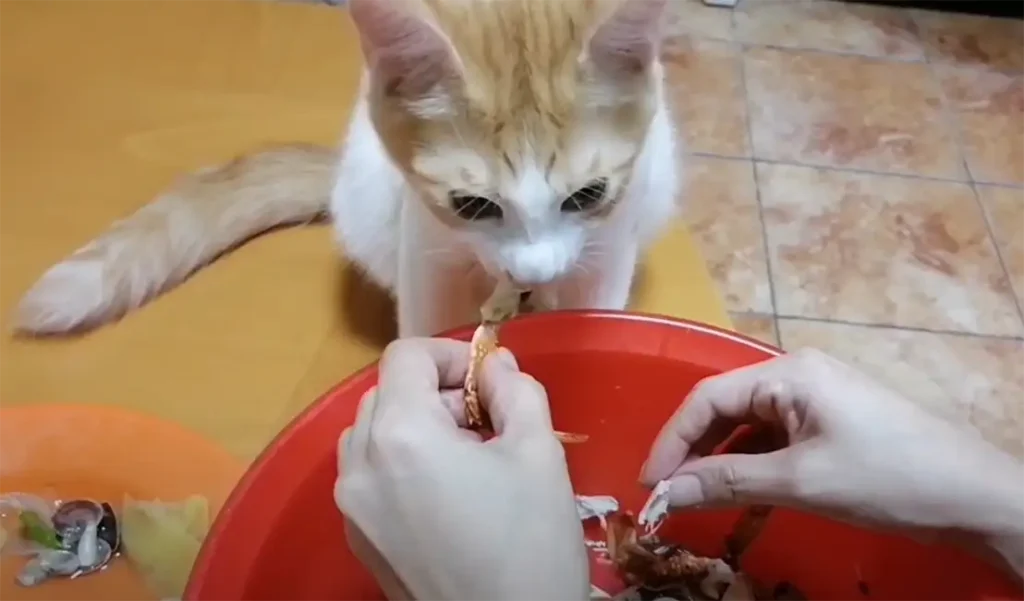
As cat owners, we strive to provide our feline companions with nutritious foods to support their health. While imitation crab meat may seem appealing to cats, it lacks essential nutrients and may cause health issues if fed regularly. Additives and preservatives in imitation crab meat can exacerbate existing conditions or lead to long-term problems. It’s best to avoid feeding it to your cat and opt for species-appropriate foods instead.
List of safe and healthy treats for cats:
While imitation crab meat may not be ideal for cats due to its lack of essential nutrients and potential risks, cats can enjoy plenty of other treats and snacks. Options include:
- Freeze-dried meat treats: Chicken, turkey, fish (salmon, whitefish), and liver.
- Catnip treats: Stimulating snacks made with catnip.
- Dental treats: Promote dental health by reducing plaque and tartar buildup.
- Grain-free treats: Suitable for cats with food sensitivities, avoiding wheat, corn, and soy.
- Limited-ingredient treats: Made with a short list of natural ingredients to minimize allergies.
- Soft treats: Easy to chew and digest, ideal for older cats or those with dental issues.
- Greenies: Dental treats that clean teeth and freshen breath.
- Tuna or salmon flakes: A simple and natural treat many cats love.
- Cat grass: Aids digestion and reduces hairballs.
- Homemade treats: Cooked chicken, turkey, or fish cut into small pieces for homemade goodness.
- Commercial cat treats: Select those with cat-friendly ingredients and no artificial additives.
Conclusion
In conclusion, it’s crucial to understand feline dietary needs and make informed choices about their nutrition. While imitation crab meat may resemble real crab meat, it lacks essential cat nutrients. Regular consumption can pose health risks, including nutritional imbalances and allergic reactions. As responsible pet owners, we should prioritize species-appropriate foods and treats. Ensuring our cats eat safely promotes their overall well-being and happiness.
FAQs
Is it safe for cats to eat imitation crab meat?
While cats can technically consume it, it’s not advisable as a regular part of their diet due to its lack of essential nutrients and potentially harmful additives.
What are the risks of feeding imitation crab meat to cats?
Regular consumption can lead to nutritional deficiencies, digestive issues, and allergic reactions, while additives and preservatives may pose health risks.
Can imitation crab meat be given to cats as an occasional treat?
It’s best to avoid it altogether, as cats have specific dietary needs that imitation crab meat doesn’t fulfill.
Are there safer alternatives?
Yes, offer your cat high-quality treats from accurate meat sources or commercial cat treats with natural ingredients.
Can cats eat crab meat?
Yes, in moderation, but remove shells and ensure it’s thoroughly cooked.
Can cats eat canned crab meat?
Avoid it due to added salts or preservatives.
Can cats eat seafood sticks?
Best to avoid due to additives and artificial ingredients.
Can cats eat crab rangoon?
Avoid it, as ingredients like cream cheese and fried wrappers may not be suitable.
Source:

